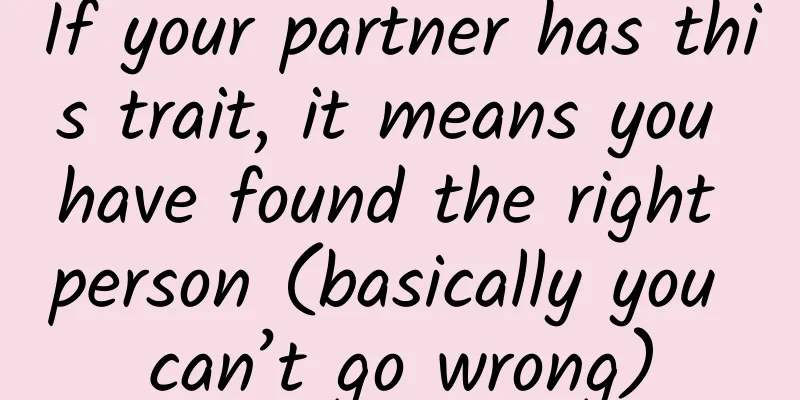If your partner has this trait, it means you have found the right person (basically you can’t go wrong)

|
When you are emotional and say a lot of hurtful things, you might think your partner will get angry, but he/she will say gently: "I am a little angry and sad, so I will calm down and talk to you later." When you lose a series of games and you get furious, your partner pats you on the back and says, "Don't be angry. Drink some water and play again." At this point, you will find that a gentle partner is comparable to an excellent psychologist. These words and actions are simple, but they seem to have magical effects, allowing a person's negative emotions to be steadily resolved by the "gentle power" of their partner at the moment. Today, let’s talk about: Why is gentleness the most precious ability in a relationship between men and women? Copyright images in the gallery. Reprinting and using them may lead to copyright disputes. How gentle you are, how strong you are Gentleness is not just about speaking softly and being weak and fragile. In psychology, it is actually a stable personality trait that generally has the following characteristics: 1 Good emotion regulation skills Gentle people are often able to sensitively perceive their own emotions and make corresponding adjustments in a timely manner. When faced with dissatisfaction and conflict, he rarely lets emotions override reason, but takes action before emotions escalate. For example, you have a big fight with someone because you have wronged him/her. Although he/she is unhappy, he/she will deal with his/her dissatisfaction, explain to you seriously, and analyze the ins and outs of the whole thing until you understand the full picture. 2 Possess strong empathy Gentle people often have excellent empathy. TA is usually able to put themselves in their partner's shoes and understand certain behaviors of their partner in different situations. Through tolerance, empathy and patience, they can help the other person build a sense of security and relieve anxiety. For example, you and your partner made an appointment to visit an exhibition today, but you were stuck in traffic and were half an hour late, causing you to miss the scheduled exhibition time and the purchased ticket would be invalidated. Just when you are regretting and feeling guilty for missing the exhibition, he/she takes the initiative to say to you: "It's okay. You've been in the car for so long. Are you hungry? Let's go eat first, and then we can look at the tickets for the afternoon." 3 More likely to accept reality and have mature problem-solving abilities Because of their stable emotions, gentle people have a higher tolerance for mistakes in life. No matter what happens, they can always adapt quickly to what is happening and find a suitable solution in time. Let’s take the example of you going on a date to visit an exhibition and you being late because of traffic jam. A gentle person will not blame you, but will quickly accept the fact that the exhibition plan was cancelled because of your lateness. While you are still regretting and blaming yourself, he/she has found another solution: change the original plan, go out for dinner first, and then look for tickets for other times. Even if other unexpected situations arise, TA can allow everything to happen and stand there steadily like a magic needle that stabilizes the sea, always finding a way to deal with all the unknowns. Only those who are truly stable at the core and strong inside can choose to respond in a soft way when faced with conflict or pressure, and only then can they have the ability to love someone tenderly. Copyright images in the gallery. Reprinting and using them may lead to copyright disputes. How do you become a gentle person? Having a gentle yet firm partner is often enviable, but how does one become a “gentle person”? From a psychological point of view, there may be two reasons: 1 Growing up surrounded by love According to John Bowlby's attachment theory, individuals will form different attachment types due to different care styles of caregivers (parents or other caregivers), among which secure attachment plays an important role in the formation of gentle traits. It stems from the caregivers' careful nurturing of their children and the parents' timely response to their children's needs, which will activate the children's "psychological security" and form an inner sense of stability. Because they have been raised in a place of love, they know better how to love someone well in an intimate relationship. For example, they will express their love more openly with more enthusiastic and expressive non-verbal behaviors (including laughter, smiling, gazing and physical contact), and they will also be able to understand the words or behaviors of others in a more positive way. When partners are caught in a vortex of negative emotions, they can even act as emotional containers and take on their partner's bad emotions. 2 I hope to be treated gently, so I learn to love others like this It is worth mentioning that not everyone can grow up in a loving environment. More people reshape their secure attachment model through their own "secondary growth" or self-awareness after adulthood. The concept of " observational learning " proposed by American psychologist Bandura explains this behavior, that is, individuals internalize ideal attachment relationships (such as healthy partner interactions) as new behavioral norms by observing them, and gradually form new emotional response patterns through imitation and practice. Many people who have lacked love and suffered inner trauma since childhood, because they want to be treated gently, will also learn to use the power of "gentleness" to love others. Just like the saying goes: Because I have been caught in the rain, I want to hold an umbrella for others. When we learn to treat others gently, we are also nurturing the self that once longed to be loved. The former is a character trait generated by the innate upbringing environment, and the latter is the softness after going through hardships. Both are equally precious and powerful. Copyright images in the gallery. Reprinting and using them may lead to copyright disputes. A truly gentle person, Be able to defend yourself more firmly Although people with gentle traits are more willing to tolerate their partners and handle conflicts in the relationship in a gentle manner, this does not mean that they will be blindly submissive in the relationship. On the contrary, the gentler a person is, the stronger their self-subjectivity is and the better they can protect their own boundaries. From the perspective of existential psychology, it can be understood as a way for individuals to deal with life, work, and interpersonal relationships with their own feelings as the center. Generally, it has the following three characteristics: Self-awareness: This can be understood as our awareness of our physical condition, emotions, etc. Autonomy: Are we able to choose our own values and goals? · Agency: whether we have the ability to deal with problems and take action to actively respond to different scenarios in order to achieve our goals. People with strong subjectivity usually think of themselves as independent and capable individuals, rather than objects to be stared at by others. Everything starts from "I". Their self-awareness, autonomy and initiative are always consistent, which also brings them a higher sense of self-identity and clearer self-cognition. They clearly know that both parties have equal status in the relationship and have the right to choose what they want, what they like, and what they want to become. Therefore, when the other half of the intimate relationship makes unreasonable demands such as "you have to make selfless contributions for me" or "you have to work harder at home for our happiness", they can firmly and gently say: "No, I don't want to/don't want to/don't like it..." This kind of rejection will not actually destroy the relationship between two people. Instead, it will let the person who truly loves you understand where your bottom line is. People with weak subjectivity are prone to "self-objectification" in relationships. Their self-identity and self-cognition are relatively vague. In existential psychology, in order to "survive" better, self-objectified individuals can only regard themselves as dependent on others, and are more likely to be consumed and anxious about relationships. In order to avoid being eroded by these emotions, they will do anything to please and obey the other party, or even "suffer without suffering". Only in this way can they get comments from their partners such as "you are really good" and "you are right", and these comments will make them feel good about themselves. For example: would rather endure the pain of plastic surgery to cater to the appearance preferences of their partner; would rather give up their own comfortable life to live a hard life with their partner... However, this kind of "gentleness" with submissiveness will not only cause a serious imbalance in the status of both parties in the relationship, but it will also be like a blunt knife, slowly grinding the relationship into bruises and eventually breaking it. Copyright images in the gallery. Reprinting and using them may lead to copyright disputes. How to cultivate yourself into a gentle person? Although gentleness is precious, it does not mean that it is extremely difficult to learn. On the contrary, it is reflected in every little detail in the relationship. If you want to be a gentle and strong person and enjoy an intimate relationship without internal consumption, you can refer to the following methods: First of all, if you realize that your gentleness is a kind of gentleness with obedience, you can regard yourself as a domineering "king" and "deprive" the other person of the right to observe and evaluate himself. Starting from yourself, re-establish your own code of conduct and evaluation system. Change from “I want to do something to make the other person happy” to “I want to do something to make myself happy”. Change "Do you think this dress looks good on me?" to "I don't think this dress suits me." Change “Have I met your standards?” to “Have I become the person I want to be?” Secondly, when dealing with conflicts, use "I" to start your sentences more often. Because starting with "you" is more accusatory and may provoke the other party's defense and dissatisfaction. For example: "What do you mean by what you just said? Do you have any opinion about me?" But if you start with "I", you will focus more on expressing your own feelings and emphasize the impact of the other person's behavior on "me". This will not only weaken the other person's defensive mentality, but also guide the conflict in a positive direction. For example: "I am a little unhappy because you just said this..." Finally, give yourself 3 seconds to cool down and focus on the present. The reason why you become the "ungentle" person in the relationship may be that at that moment, you are overwhelmed by your emotions: you are eager to attack and blame your partner, which makes it impossible to focus on the present. So, when you are faced with a moment that makes you ungentle, please give yourself 3 seconds to take a deep breath and ask yourself: "Can my current emotions/thoughts solve the problem?" For example, when your partner forgets to bring the keys and you are locked out of the house, when you want to get angry, take a deep breath for 3 seconds and ask yourself: "Will getting angry change the fact that I am locked out of the house?" The answer is no. After reaching this conclusion, you will find that what you should solve right now is to accept the fact that you are locked out and find a locksmith to open the door. As the door opens, you will find that the "anger" that originally dominated suddenly disappears. Copyright images in the gallery. Reprinting and using them may lead to copyright disputes. In conclusion: In intimate relationships, tenderness is often the most underestimated force. When conflicts arise, TA will use stable emotions, high empathy and intelligent boundaries to protect you steadily. Gentle TA can quietly bridge those small cracks in the relationship and extinguish every moment of conflict that is about to break out. It is not a magic that appears by chance, but a lasting force that becomes the source of nourishment for intimate relationships. In this huge playground of life, I hope you can find that "gentle and firm" person, and have fun together freely. Even if you don't meet a gentle partner, I hope you can become a gentle person, who has the ability to love yourself and has the energy to love others. The world and I love you. References [1] Roger Hawke. 40 Studies That Changed Psychology. Translated by Bai Xuejun et al. Posts and Telecommunications Press, 2018 [2] Roland Miller. Intimate Relationships. Translated by Wang Weiping. Posts and Telecommunications Press. 2024 [3] [Germany] Schneider. Existential psychology: an integrated clinical perspective. Translated by Cheng Shiying et al. China Renmin University Press. 2010 [4] Marshall Rosenberg. Nonviolent Communication. Translated by Ruan Yinhua. Huaxia Publishing House. 2009 [5] Sun Huimei. The relationship between self-objectification and mental health of college students: the regulatory role and intervention of self-acceptance (Master's thesis, Qinghai Normal University). [6] Jiang Guangrong et al. Contemporary Psychological Counseling and Treatment System. Higher Education Press. 2007 Planning and production Source: Yixinligongkaike (ID: yixinligongkaike) Reviewer: Fan Chunlei, Associate Researcher, Institute of Psychology, Chinese Academy of Sciences Editor: Zhong Yanping Proofread by Xu Lailinlin The cover image and the images in this article are from the copyright library Reprinting may lead to copyright disputes |
<<: What did humans look like 16,000 years ago? Here, let me show you their "photos"
Recommend
How much does dog meat cost per pound on the market in 2020? What are the profits and costs of breeding?
There is nothing better than having a hot pot in ...
Essential information for APP promotion and operation: the most comprehensive and complete online event planning guidance program!
Event operation is an explosive operation method ...
Kuaishou e-commerce grass-growing guide in 2021!
At the beginning of 2021 , Kuaishou E-commerce la...
It is not far from Sanxingdui, which is popular on the Internet, and has an amazing "connection" with Sanxingdui!
Who is the most popular archaeological site in re...
The "ginseng" in the desert, the "white ginseng" that was praised in the Han Dynasty, can actually cope with sandstorms?
Cistanche deserticola, also known as Cistanche de...
New iPhone patent: Home button can pop out
Apple has filed a new patent for a small joystick...
Advertising Cases | Traditional lending and driving test industry advertising cases and data references!
Today, I would like to share with you some invest...
Why is the speed of light exactly 299792458 meters per second, neither more nor less?
Whether you are a professional physicist or not, ...
Why is the water conservancy project from 2,300 years ago still in use today? The principle of Dujiangyan is amazing
If you were asked to quickly name two famous wate...
So this is the secret of Dujiangyan!
Dujiangyan Irrigation Project Located on the Minj...
How to carry out fission activities well? Share a routine!
In fact, all fission activities have only one rou...
Baidu, Toutiao, Guangdiantong and other OCPX intelligent bidding modes, help you fully analyze in 5 minutes!
I changed batches of materials, but there was no ...
Shein, still a Chinese unicorn?
In October this year, the media asked Marcelo Cla...
Why are there "silkworm cocoons" hanging on trees? Inside are "bug agents" protecting the green
As the weather gets warmer, some trees have small...
Without operational resources, how can a product be operated on its own?
If there are no operational resources, we can fin...









